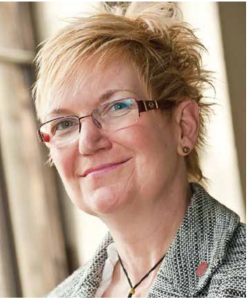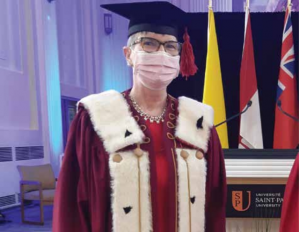In this installment of our popular interview feature, we bring to light many of the ground-breaking changes that have helped to revitalize Saint Paul University under the steady hand and guidance of long-time university Rector Chantal Beauvais. For many years, Saint Paul was a little-known enigma in Old Ottawa East, a looming physical presence in the centre of the community but an educational non-entity to most of us who thought of the institution as a religious seminary, if they thought of it at all. Today, COVID notwithstanding, Saint Paul is a bustling beehive of innovation and a leader in multidisciplinary learning, thanks in part to the vision of Rector Chantal Beauvais.
THE MAINSTREETER: Dr. Beauvais, perhaps we can start with you telling us a little bit about yourself, your background and how long you’ve been with Saint Paul University.
DR. BEAUVAIS: I was born in Rouyn Noranda, a mining town, in the Abitibi-Témiscamingue region of Quebec. My relatives are still there, but I have spent more than half of my professional life in Ontario. I left home when I was 18 to attend the Loyalist College of Applied Arts and Technology in Belleville, Ontario where I studied accounting. I later restarted my academic journey in philosophy, with a Bachelors, Masters, and then a PhD at the University of Ottawa; I’m a philosopher by training. I’ve been at Saint Paul since 2001 and have always been involved in academic administration. I’ve been Rector since 2009. Before Saint Paul, I worked at the Royal College of Physicians and Surgeons of Canada and the Council of Ethics of Human Research.
THE MAINSTREETER: What have been the most significant changes you’ve seen at the University since you assumed your position?
DR. BEAUVAIS: Significant changes? Where to start? If we look at infrastructure, I think a lot has been done because these are older buildings. We were able to renovate a lot of spaces – the Student Centre where the cafeteria is, the library and the Mauril Bélanger centre. We’re not finished yet. We still have other projects. The creation of new schools would be the other significant change. There is now a School of Transformative Leadership and Spirituality and a Centre for Social Innovation. Soon we’ll have a School of Integral Ecology. Most of the schools at SPU are interdisciplinary, contrary to many other institutions. Here, a School of Public Ethics will have somebody who is trained in politics and someone else trained in philosophy; the School of Conflict Studies will have sociologists, anthropologists and theologians. The school structure allows us to better present our programs to the community, and also creates a sense of belonging for the students.
THE MAINSTREETER: Do you think Saint Paul is now better known in the community than it used to be?
DR. BEAUVAIS: We did a survey, I think back in 2006, and we found out that almost nobody knew about Saint Paul University, even in the local postal code. And those who knew Saint Paul University thought we were like a seminary. That was an eye opener and we decided to rebrand the university, invest more in marketing and enter into relationships with different partners and school boards. All that had to be built as there weren’t really any structured outreach mechanisms. People knew Saint Paul from word of mouth. And we decided, well, that’s not enough. We needed to start building a marketing strategy, and I think it’s going very well. We’re also online right now so that also helps our visibility, not only in Canada, but abroad as well.
THE MAINSTREETER: How has COVID impacted the university?
DR. BEAUVAIS: When we talk about COVID, we often talk about the negative impacts, and certainly we had a loss of revenues and more expenses than we had planned. However, we were able to switch from face-to-face delivery to online delivery in two days. Some of our partners took much longer to achieve that. I think that’s a testament to the dedication of our professors and staff. The students were very happy in their courses and the way they were laid out. Also, the professors and staff realized we could reach out to many more people, not just international students, but also people who have mobility challenges and those who reside in more remote areas. Normally, they wouldn’t come on campus for their courses. COVID opened up new doors for us. Keeping online options in the future is a delicate issue because we can’t force professors to choose that mode of delivery. We have to engage in a dialogue and some of them have discovered the advantages. Some initially thought we would lose too much by offering distance courses, or they thought that some of the courses could not possibly be offered online because they’re very abstract. But they found that with the evolution of technology, there’s so much that is possible, and you can really offer a lively course online. Some of the professors now prefer this option.
THE MAINSTREETER: How has the identity of the university changed during your tenure?
DR. BEAUVAIS: I would say it hasn’t changed fundamentally. It is still following the Catholic tradition and is bilingual. Actually, bilingualism is probably stronger now. About 33% of the students used to be registered in the French program – now it’s at least 50%. This is in part because we have articulation agreements with French colleges. It’s sensitive to market a Catholic institution. It’s a very funny semantic word: Catholic. People have their own understanding of what that means; it is a challenge, as there’s a lot of nuance and it takes time to explain. Universities were founded in the medieval times by Catholic institutions. A Catholic institution has rigorous norms, and there’s an interaction between faith, reason and culture. You cannot ignore the progress in science and in culture – everything is intertwined. Openness is important as well. SPU is not offering courses to only Catholics; there are people of every faith and no faith. We welcome everybody who is interested in our programs and interested in making this world a better place. And it works. We have very diverse classrooms. The Congregation of Missionary Oblates of Mary Immaculate are still our world sponsors. That means they are responsible to the Vatican for the Catholic identity of the university. They oversee at a governance level that we’re still a Catholic University, according to the Vatican norms, but also according to the local colours. Being a Catholic University in Ottawa is not the same as in Parisor Colombia, as there are cultural aspects to be taken into consideration.
THE MAINSTREETER: You’ve been moving more and more into social engagement and social justice. Could you please highlight for me some of the changes or innovations of which you’re most proud?
DR. BEAUVAIS: I think the first one is that we have been able to embrace a vision of social justice across the schools. One school in particular embraces this theme – the Élisabeth Bruyère School of Social Innovation. Its goal is to eradicate poverty, focus on social exclusion, and things like that. I’m very happy about this program because it’s not just a theoretical program of learning about social justice; the students are actually involved in the community. They can start their own businesses or social organizations, and the young people really enjoy this. The enrolment in these programs at the moment is around 100 – both undergraduate and graduate.
The Graduate school is picking up more and more students. At the undergraduate level, a bit more effort is needed to market social innovation and interdisciplinary programs, as some people are still unsure what is meant. Social innovation is basically social change, democratic governance, and social economy – it revolves around those three pillars. I think SPU students really enjoy the interdisciplinary aspect. We have heard stories of students coming from other universities who might have been registered in a psychology program with a desire to help people and they got a lot of theoretical courses and science courses. It’s not bad, but it just doesn’t meet their expectations of being able to help people.
These students migrate to our human relations and spirituality program, and they are very happy because it’s not just theory, it’s also about social justice. We also have a School of Ethics, Social Justice and Public Service; it used to be our School of Public Ethics. Their course offerings now are more directly linked to social justice. Ethics and social justice are, I think, good companions, and we’re trying to create a stronger link between the university and the public service community. Indeed, we now have a university champion, Nancy Chahwan, Senior Associate Deputy Minister of National Defence. [Note: Ms. Chahwan recently retired, and SPU is awaiting the appointment of a new champion.] This Public Service program appoints senior bureaucrats to facilitate relationships between the public service and the institution and vice versa. Because of that, we’re now able to create new links.
We also have some public servants coming to our classrooms to give talks about ethics and conflict resolution plus we organize events together. For example, we have hosted a winter session on Algorithms and Big Data in the Public Sectors. We’ve been organizing this now for three years; it’s a partnership between the public service, the Institute of Governance, and SPU; it’s one week when public servants join us on campus, and we learn about themes such as algorithms and big data. We have also had people from the public service come on campus to assist students in the writing of their CVs and offer mock interviews for employment. Finally, I am very proud of the Centre for Safeguarding Minors and Vulnerable Persons. The mission of this centre is to help eliminate the threat and trauma of sexual abuse in society and in the Church. There are many events, workshops, webinars and, conferences organized by this Centre. [See the link https://ustpaul.ca/en/centre-forsafeguarding-minors-and-vulnerablepersons_7038_1109.htm]
THE MAINSTREETER: Are sessions of the Centre for Safeguarding Minors and Vulnerable Persons open to the public?
DR. BEAUVAIS: Yes, for example, there is a course on vulnerability as well as a course on spiritual abuse. We decided to create this Centre because we thought that as a Catholic and Oblate institution, we had a personal responsibility to be part of the solution. We get a lot of interest. Sometimes we have people who were abused come and knock on the door, and we try to find appropriate resources for them. We’re also looking at the question of how to deal with perpetrators according to civil laws and the law of church, and also treatment for perpetrators. We also have a counseling centre open to victims; anybody in the community who wants to can seek counseling. Indeed, SPU has probably the largest Counseling Centre in in the area; I think in 2020 we had 20,000 visits. We have about 200 Master’s students in counseling, and they do their job placements here in the clinic under supervision. And people pay what they can afford. We suggest an amount but if people cannot afford it, we can negotiate because mental health is a big, big issue.
THE MAINSTREETER: How can the community engage more with Saint Paul University?
DR. BEAUVAIS: There are a number of opportunities: the indigenous centre, when it opens to the public; Doors Open Ottawa; and by using public spaces like the cafeteria – with its very good food, and we intend to offer beer and wine in the Inner Courtyard, by the cafeteria, when it is completed. At some point we were exploring having a gym here. If anybody in the community is entrepreneurial, we can explore that. There is also philanthropy. If people are interested in leaving a legacy, this is something that we always use for scholarships for students. Your question makes me think about how we could engage the community to build more bridges. The Mainstreeter’s interest, it’s an excellent initiative. And I made a presentation to the Ottawa East Community Association several years ago. I also had this dream that if I had a huge grant or donation, I would build a glass semi-circle that would unite the two buildings and be lit by particular colours. For example, if it was orange, everybody would be welcome during that week to talk about innovation.
The students could present posters, community members could come to have dialogues, we could have speakers. The next week it could be purple, and be about conflict resolution, and the following week, green for the environment. And then the university would become a real hub. There would be the building of knowledge, not just by the academics but the community members as well. I think that ideally, universities should be encouraging community help.
We know that Old Ottawa East is one of the most highly educated parts of the city, and this is one of the reasons why we created a PhD in Interdisciplinary Research on Contemporary Social Issues. We had a lot of retired public servants who wanted to do a PhD in Conflict Studies or Ethics, but they didn’t have the prerequisites that are normally required. We decided to create this interdisciplinary program, where they can come in with whatever Master’s degree they have, and they can then reflect on a particular issue, perhaps from their career. We have about 15 candidates right now in that program, and most of them are preoccupied with ethics and social justice. Organizing events together would also be good. There was an example of that when we collaborated on work related to aging in an aging society. We held a workshop open to organisations, and people were very interested. It was wonderful, so these things are possible.








